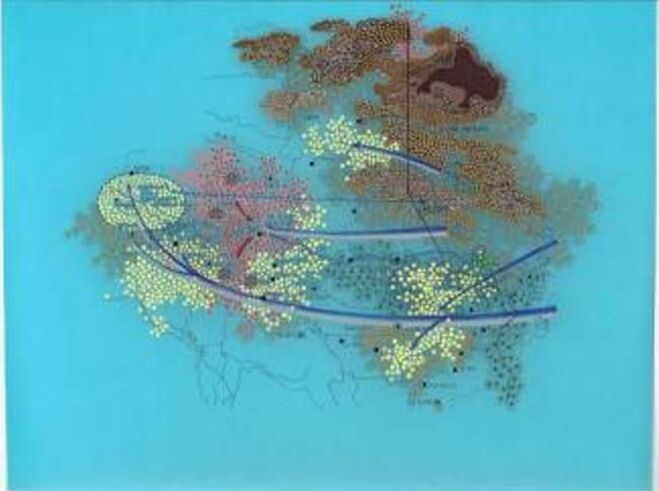|
There is a current art exhibit in Washington, D.C., that I am hoping to see -- “Artists Respond: American Art and the Vietnam War, 1965-1975,” at the Smithsonian American Art Museum.
Holland Cotter in The New York Times calls it “protest art” from the American point of view. But the “second, smaller” part of the show I most want to see is “Tiffany Chung: Vietnam, Past Is Prologue,” a view of the Vietnam War era through Vietnamese eyes – “far more than a mere add-on,” as Cotter put it. The Vietnamese people experienced that war – in some ways 180 degrees differently -- but it is safe to say all suffered. In 1991 I visited “post-war” Vietnam with a small group involved in child care. My wife was doing vital volunteer work by frequently visiting India but she also visited Thailand and the Philippines. I joined her on the trip to Vietnam to deliver goods to a hospital and visit facilities in both “North” and “South” Vietnam. I was most definitely not there to work or act like a journalist, but I could not help looking and listening to how “The American War” had impacted Vietnamese lives. Saigon, now called Ho Chi Minh City: We met a doctor doing complicated surgery. He let us gown up and observe a complicated facial procedure done by a visiting American doctor, the mutual language in the operating room being French. We got to spend enough time with the doctor to learn he had been on the “wrong” side when the North took over, and was sent to a camp deep in the countryside. I gathered that his family had assets, and he had a great reputation, and he was released from the camp and allowed to resume his profession, refreshing his skills at major hospitals in Asia. He was an asset. In a relaxed social setting, the conversation got around to how he was able to put the war behind him, to function, to move on. I totally paraphrase his answer; it has been a long time, after all. He said you cannot live in the past, you have to get back to “normal” as smoothly and quickly as possible. When I (subtly, I hope) asked about the lost years in the camps, he showed no bitterness. He was still a surgeon, putting people back together again. Life went on. Hanoi Region. We worked our way up north (baguettes and coffee on the beach; ancient ethnic villages; a growing crafts shop outside Da Nang) and we flew to Hanoi. On a chilly day, we took a jitney out to visit a rural orphanage. Our interpreter was a woman around 30 who worked in the sciences and was fluent in English. I happened to sit next to her. Far into the countryside, I noticed circular ponds scattered on the flat land. I asked the interpreter what the waterholes were for – fishing? rice? source of irrigation? Actually, she said, with no trace of emotion or agenda, they were holes left over from bombs. She did not mention Richard Nixon or Henry Kissinger or the “Christmas bombing” of Hanoi and Haiphong in late December of 1972. She remembered, she said casually, living at a school, and hearing the bombs, and later discovering children her age had been killed or injured. I did not ask any other questions. The orphanage was shabby, but the workers were doing the best they could. They let us hold children as we walked around. They had a handle on each child, would not release children for adoption if relatives claimed them. We were bringing some aid, and people were courteous. A young worker pointed at my ball cap, from the 1990 World Cup, and he said, “Maradona,” and I gave him the cap. And then we flew on. Now I read about the show at the Smithsonian about the remaining terrible divisions in the United States over the Vietnam War. I hope to see that show, as well as its companion piece about Vietnamese reaction to the American War – “more than an add-on,” indeed. https://www.nytimes.com/2019/04/04/arts/design/vietnam-war-american-art-review-smithsonian.html Tiffany Chung: Vietnam, Past Is Prologue: https://americanart.si.edu/exhibitions/chung My past articles about John McCain, American hero, and Vietnam: https://www.georgevecsey.com/home/category/vietnam My article about the excellent crafts shop outside Da Nang: https://www.georgevecsey.com/home/-happy-lunar-new-year
bruce
4/12/2019 10:13:05 pm
george,
George Vecsey
4/13/2019 09:46:56 am
Bruce, thank you for the compliment(s). I try to avoid my most blatant comments of late 60s, since I know people who served over there, and did not get back, and I also know proud officers who came home from combat to find LBJ and McNamara had already deduced it was a lost cause.
bruce
4/14/2019 08:49:49 pm
george, 4/14/2019 04:47:07 pm
George. Bruce and I share an appreciation for your vast scope of experiences, sensitivity and insight in reporting them.
bruce
4/14/2019 08:38:58 pm
alan, 4/14/2019 04:52:55 pm
If you have time when in DC, the National Museum of African American History and Culture is a must. Allow the better part of a day, and book in advance. Comments are closed.
|
Categories
All
|










